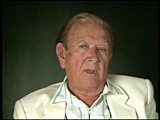You searched for: ���������������������������������������������������������������������cxfk69���just
<< Previous | Displaying results 501-510 of 572 for "���������������������������������������������������������������������cxfk69���just" | Next >>
-
Sophie Turner-Zaretsky describes her education in London
Oral HistorySophie was born Selma Schwarzwald to parents Daniel and Laura in the industrial city of Lvov, two years before Germany invaded Poland. Daniel was a successful businessman who exported timber and Laura had studied economics. The Germans occupied Lvov in 1941. After her father's disappearance on her fifth birthday in 1941, Sophie and her mother procured false names and papers and moved to a small town called Busko-Zdroj. They became practicing Catholics to hide their identities. Sophie gradually forgot that…
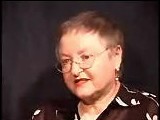
-
Ruth Webber describes the bitterness that she felt after the end of the war when she was in an orphanage in Krakow
Oral HistoryRuth was four years old when the Germans invaded Poland and occupied Ostrowiec. Her family was forced into a ghetto. Germans took over her father's photography business, although he was allowed to continue working outside the ghetto. Before the ghetto was liquidated, Ruth's parents sent her sister into hiding, and managed to get work at a labor camp outside the ghetto. Ruth also went into hiding, either in nearby woods or within the camp itself. When the camp was liquidated, Ruth's parents were split up.…
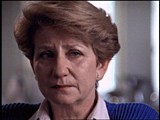
-
Cecilie Klein-Pollack describes deportation from Huszt
Oral HistoryCecilie was the youngest of six children born to a religious, middle-class Jewish family. In 1939, Hungary occupied Cecilie's area of Czechoslovakia. Members of her family were imprisoned. The Germans occupied Hungary in 1944. Cecilie and her family had to move into a ghetto in Huszt and were later deported to Auschwitz. Cecilie and her sister were chosen for forced labor; the rest of her family was gassed upon arrival. Cecilie was transferred to several other camps, where she labored in factories. Allied…
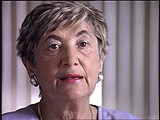
-
Ruth Webber describes the bitterness that she felt after the end of the war when she was in an orphanage in Krakow
Oral HistoryRuth was four years old when the Germans invaded Poland and occupied Ostrowiec. Her family was forced into a ghetto. Germans took over her father's photography business, although he was allowed to continue working outside the ghetto. Before the ghetto was liquidated, Ruth's parents sent her sister into hiding, and managed to get work at a labor camp outside the ghetto. Ruth also went into hiding, either in nearby woods or within the camp itself. When the camp was liquidated, Ruth's parents were split up.…

-
Bart Stern describes how he survived to be liberated in the Auschwitz camp
Oral HistoryFollowing the German occupation of Hungary in March 1944, Bart was forced into a ghetto established in his home town. From May to July 1944, the Germans deported Jews from Hungary to the Auschwitz killing center in occupied Poland. Bart was deported by cattle car to Auschwitz. At Auschwitz, he was selected to perform forced labor, drilling and digging in a coal mine. As Soviet forces advanced toward the Auschwitz camp in January 1945, the Germans forced most of the prisoners on a death march out of the…
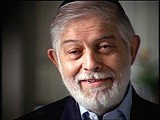
-
US veteran Robert Patton describes Mauthausen upon liberation and his 2000 visit to the same site
Oral HistoryRobert Patton, of Chapel Hill, North Carolina, was with the 65th Infantry Division.
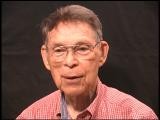
-
Benjamin (Beryl) Ferencz describes collecting evidence of death marches
Oral HistoryBen was born in a small village in the Carpathian Mountains of Transylvania in Romania. When he was an infant, his family moved to the United States. Ben attended Harvard University, where he studied criminal law. Ben graduated from Harvard University Law School in 1943. He joined a US anti-aircraft artillery battalion that was training in preparation for an Allied invasion of western Europe. At the end of World War II in Europe, Ben was transferred to the war crimes investigation branch of the US Army. He…
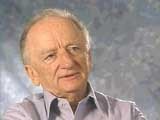
-
Doris Greenberg describes arrival procedures at Ravensbrück
Oral HistoryThe Germans invaded Poland in 1939 and established a ghetto in Warsaw in 1940. After her parents were deported, Doris hid with her sister and other relatives. Doris's sister and an uncle were killed, and she learned that her parents had been killed. Her grandmother committed suicide. Doris was smuggled out of the ghetto and lived as a non-Jewish maid and cook, but was ultimately deported to the Ravensbrück camp. Upon arrival there, Doris and her friend Pepi contemplated swallowing poison, but decided…
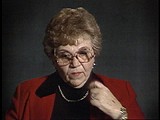
-
Siegfried Halbreich describes conditions and forced labor in the Gross-Rosen camp
Oral HistoryAfter Germany invaded Poland on September 1, 1939, Siegfried fled with a friend. They attempted to get papers allowing them to go to France, but were turned over to the Germans. Siegfried was jailed, taken to Berlin, and then transported to the Sachsenhausen camp near Berlin in October 1939. He was among the first Polish Jews imprisoned in Sachsenhausen. Inmates were mistreated and made to carry out forced labor. After two years, Siegfried was deported to the Gross-Rosen concentration camp, where he was…
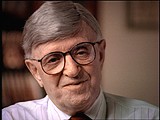
-
Abraham Bomba describes the Treblinka gas chambers
Oral HistoryExcerpt from Holocaust survivor Abraham Bomba's oral history testimony describing gas chambers at the Treblinka killing center.
